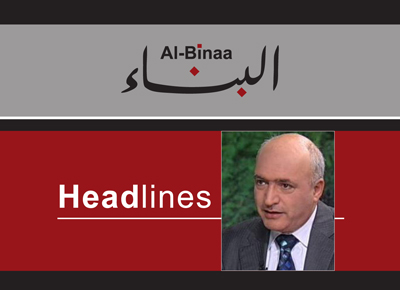U.S. Suspension of Some Sanctions on Syria… A Six-Month Deadline for Compliance / Hochstein: Withdrawal Within Deadlines to the Blue Line, and the Army in Naqoura
Presidency Under Pressure Amid Foreign Interventions… Geagea Dodges Supporting Aoun

January 08, 2025
The political editor wrote
The U.S. Treasury Department’s announcement of a partial suspension of sanctions on Damascus has allowed for limited improvements in sectors such as electricity and healthcare. This comes after the current ruling authority in Damascus, through its Minister of Trade, warned of an impending economic and humanitarian disaster unless sanctions are lifted. Meanwhile, the acting Foreign Minister called for urgent assistance in lifting sanctions during visits to Qatar and Jordan.
Observers of the sanctions issue see the partial and temporary U.S. measures – limited to a six-month freeze on select sanctions and excluding measures that would restore Syria’s normal banking operations – as a clear American signal. The message is that while Syria’s collapse is undesirable due to the chaos it would unleash, any revival is strictly conditional. Such conditions align with U.S. policies for a new governing framework, articulated by U.S. diplomat Barbara Leaf in discussions with Syrian officials. These include forming a broad-based transitional government, granting a central role to Kurdish factions allied with Washington, taking concrete steps to eliminate ISIS, drafting a civilian constitution, and preparing for elections within 18 months, as stipulated by U.N. Resolution 2254. Central to these conditions are security arrangements with the occupying entity that prioritise Israeli security concerns.
In southern Lebanon, developments surrounding the ceasefire agreement have taken a significant turn. Contrary to earlier political and media statements, Israel has declared its commitment to the ceasefire agreement and denied intentions to manipulate its terms or extend its presence in southern Lebanon indefinitely. Israel has also separated the ceasefire from demands to disarm the resistance.
This commitment, reinforced by American assurances, has alleviated Lebanese concerns about the agreement’s trajectory. A key moment was the successful meeting of the oversight committee, chaired by U.S. envoy Amos Hochstein, which ensured the Lebanese army’s deployment in the western sector up to the Naqoura border along the Blue Line. Concurrently, Israeli forces began preparations for withdrawal from the central sector.
The Lebanese army, during the Naqoura meeting, rejected Israeli claims that its slow deployment was delaying the occupation army’s withdrawal. The army affirmed that no obstacles related to Hezbollah’s commitments or its own readiness were causing delays, asserting instead that the sole impediment was the slow pace of Israeli withdrawal.
On the eve of a crucial presidential election session, Lebanon is witnessing a flurry of interventions by foreign envoys from the U.S., France, Saudi Arabia, and Qatar. The leading candidate remains Army Commander General Joseph Aoun. However, U.S. and Saudi efforts to persuade the Lebanese Forces leader, Samir Geagea, to support Aoun’s candidacy have failed. Geagea insists that Hezbollah and Amal Movement must first nominate Aoun before he considers his stance, preferring instead to explore consensus around former Minister Jihad Azour.
Despite these hurdles, Aoun’s candidacy remains under discussion as the decisive Thursday session approaches. Meanwhile, consultations are underway about alternative names for subsequent sessions if Aoun fails to secure the required 86 votes for election.



